Literary rating: ★★½
Kick-butt quotient: ☆☆½
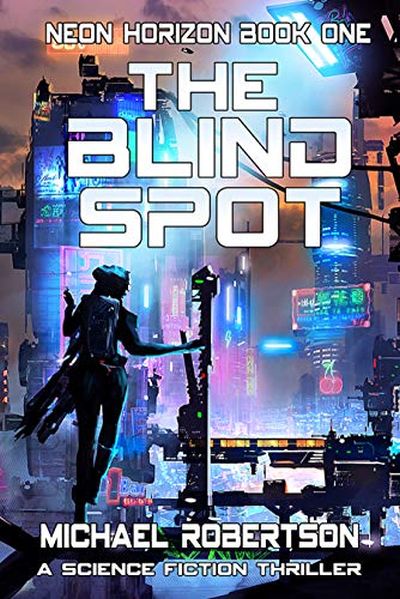 On the surface, Scala City is an idyllic, hi-tech world of prosperity, peace and morality, albeit at the cost of omnipresent surveillance of its residents. But there’s a dirty little secret. The Blind Spot is an area where surveillance is barred, and where the citizens of Scala City go to blow off their sordid steam. Its residents have cybernetically enhanced bodies, something rejected by Scala City, and a zero-tolerance policy for any kind of monitoring. It’s run by Wrench, who has kept his daughter Marcie Hugo under strict control since the death of her mother. However, like all teenagers, the 16-year-old Marcie is seeking to spread her wings, and has been making covert excursions into Scala City, with the aim of moving there some day soon.
On the surface, Scala City is an idyllic, hi-tech world of prosperity, peace and morality, albeit at the cost of omnipresent surveillance of its residents. But there’s a dirty little secret. The Blind Spot is an area where surveillance is barred, and where the citizens of Scala City go to blow off their sordid steam. Its residents have cybernetically enhanced bodies, something rejected by Scala City, and a zero-tolerance policy for any kind of monitoring. It’s run by Wrench, who has kept his daughter Marcie Hugo under strict control since the death of her mother. However, like all teenagers, the 16-year-old Marcie is seeking to spread her wings, and has been making covert excursions into Scala City, with the aim of moving there some day soon.
The problem is, an escalating series of terrorist attacks have been occurring in the city, which it appears someone is trying to blame on the Blind Spot, in order to trigger a war between them and the city. After one of Marcie’s trips is caught on camera, the heat gets turned up, and she – along with the Blind Spot’s most infamous computer hacker – becomes the only person who can prevent a conflict that could lead to the destruction (at least in a digital sense) of both sides. She believes the perpetrators may have help from inside the Blind Spot, suspecting in particular a close accomplice of Wrench, who also happens to be the father of her best friend.
The world-building here is solid enough. As well as Marcie, events unfold through the sad eyes of Nick, an overweight and largely unloved Scala City resident. He’s addicted to the Wellbeing App, which records only the positive things people say about each other, sharing it with them. This is…scarily plausible, to be honest, though the split focus is a little unwieldy. No connection between this pair of story lines is established until about two-thirds of the way through the book, although they work well enough on their own terms. The idea of a city with a Jekyll and Hyde personality is also well-executed.
A bigger problem, for me, was the sudden reticence on Marcie’s end. Initially, we experience things through her eyes, knowing everything she knows. Then, at a certain point, we get cut out of the loop, from a narrative point of view, as she and her hacker pal begin their plot to track down and expose the real terrorists. We’re left on the outside, not knowing what’s going on – and when we do find out, there naturally being a grand reveal, it’s not very satisfying. It relies too much on the “all-powerful hacker” trope, and the identity of the traitor in their midst is also unconvincing. The story ends up being a swing and a miss, though with the book being free on Amazon, I probably can’t complain. Though it’d have to be at the same price point to get me to go any further into the series.
Author: Michael Robertson
Publisher: Self-published, available through Amazon, both as a paperback and an e-book
Book 1 of 6 in the Neon Horizon series.





 Buffalo police officer Megan (Sadeghian) is a highly-skilled cop, but has a crisis of confidence after being involved in the accidental shooting of a colleague. To help get her out of that mindset, partner Jeremy (Johnson) invites Megan on a weekend camping getaway in upstate New York, along with another couple. This goes horribly wrong, after they stumble across the summary execution of a drug-dealer by the local sheriff, Preacher (Kennedy) and his death squad. The four campers are now a problem for Preacher, so he seals off the area, and unleashes a slew of hunters, putting a ten thousand dollar bounty on the head of each target. Of course, you don’t have to be psychic to see it won’t be easy, courtesy of Megan.
Buffalo police officer Megan (Sadeghian) is a highly-skilled cop, but has a crisis of confidence after being involved in the accidental shooting of a colleague. To help get her out of that mindset, partner Jeremy (Johnson) invites Megan on a weekend camping getaway in upstate New York, along with another couple. This goes horribly wrong, after they stumble across the summary execution of a drug-dealer by the local sheriff, Preacher (Kennedy) and his death squad. The four campers are now a problem for Preacher, so he seals off the area, and unleashes a slew of hunters, putting a ten thousand dollar bounty on the head of each target. Of course, you don’t have to be psychic to see it won’t be easy, courtesy of Megan.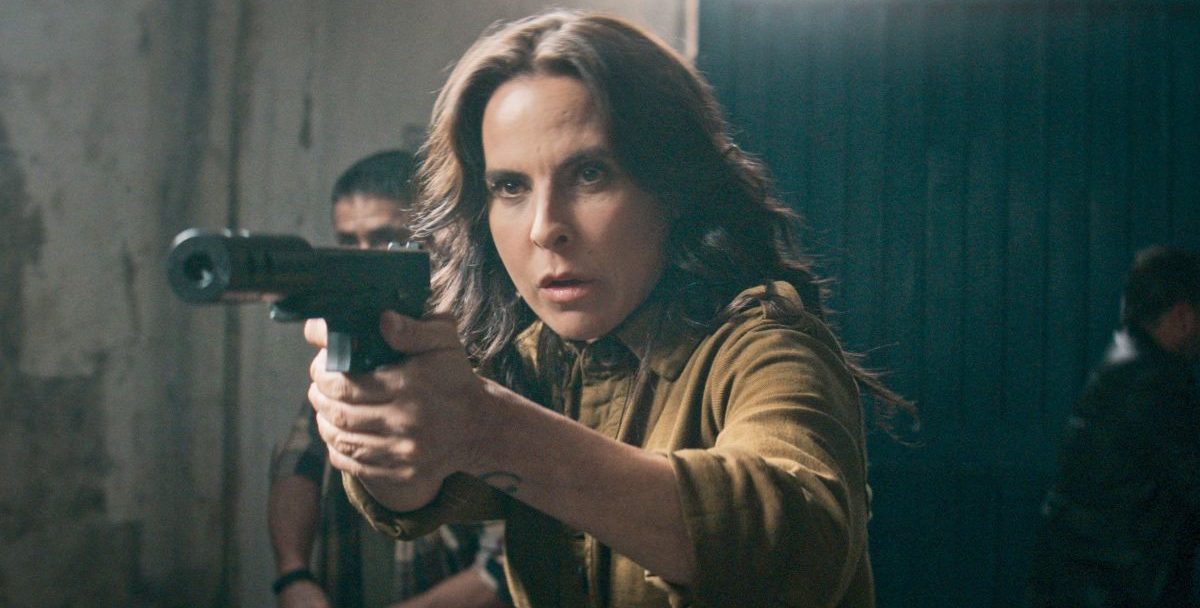 ★★★
★★★ There are quite a lot of familiar faces for this one. There’s the long-running relationship between Teresa and Russian mobster, Oleg Yosikov (Gil). This is somewhat reflected in the love triangle of her daughter, now very much her own young woman. Sofia has to decide between Oleg’s son, Fedor, and street-kid Mateo Mena. He rescues Sofia from a sticky situation, and those who want to use Sofia to force her mother into compliance with their wishes. There’s also faithful sidekick Batman, who has been with Teresa since the beginning. On the other side, as well as her ex-husband, whose power is now grown to such an extents as to be a real threat, there’s long-running DEA nemesis Ernie Palermo. He brought Teresa in, and is very keen for her to serve the rest of her eighty-five year prison sentence.
There are quite a lot of familiar faces for this one. There’s the long-running relationship between Teresa and Russian mobster, Oleg Yosikov (Gil). This is somewhat reflected in the love triangle of her daughter, now very much her own young woman. Sofia has to decide between Oleg’s son, Fedor, and street-kid Mateo Mena. He rescues Sofia from a sticky situation, and those who want to use Sofia to force her mother into compliance with their wishes. There’s also faithful sidekick Batman, who has been with Teresa since the beginning. On the other side, as well as her ex-husband, whose power is now grown to such an extents as to be a real threat, there’s long-running DEA nemesis Ernie Palermo. He brought Teresa in, and is very keen for her to serve the rest of her eighty-five year prison sentence.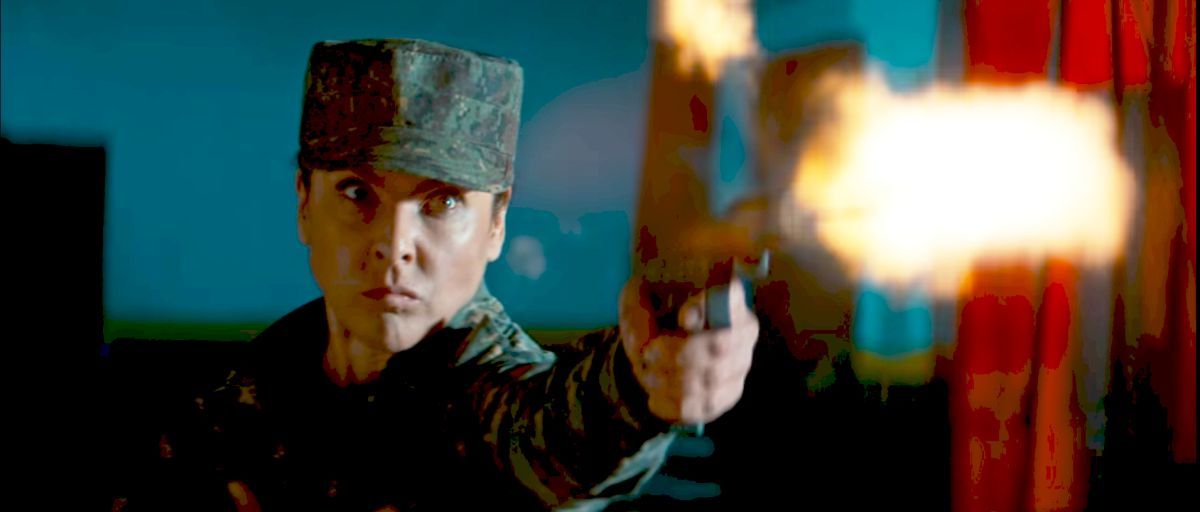
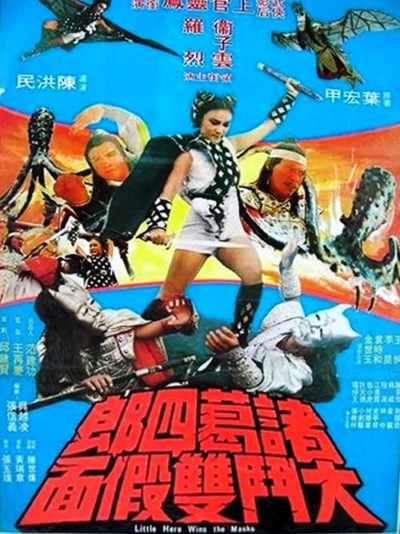 Although almost a decade earlier than Lin Hsiao Lan’s slew of fantasy kung-fu flicks, this shares a lot of the same elements – not least an approach to narrative coherence best described as “informal.” This starts at the beginning, where we don’t even get introduced to the participants, before the martial arts breaks out. As we learn a little later, it turns out this pits Chu-Kwok Su-Lan (Shang-Kuan) against three members of the Devil’s Gang, in defense of her two, largely useless sidekicks. This is just the first of numerous encounters between our hero – yes, it’s
Although almost a decade earlier than Lin Hsiao Lan’s slew of fantasy kung-fu flicks, this shares a lot of the same elements – not least an approach to narrative coherence best described as “informal.” This starts at the beginning, where we don’t even get introduced to the participants, before the martial arts breaks out. As we learn a little later, it turns out this pits Chu-Kwok Su-Lan (Shang-Kuan) against three members of the Devil’s Gang, in defense of her two, largely useless sidekicks. This is just the first of numerous encounters between our hero – yes, it’s  Okay, I will admit that this strained credibility on a number of occasions, to the point that buttons were popping off its shirt. But I don’t think the makers were exactly going for gritty realism, and the bottom line is: I enjoyed this a lot. Certainly, more so than
Okay, I will admit that this strained credibility on a number of occasions, to the point that buttons were popping off its shirt. But I don’t think the makers were exactly going for gritty realism, and the bottom line is: I enjoyed this a lot. Certainly, more so than  Turns out, Erin has a past, and the publicity resulting from her impromptu heroism brings it to visit. She finds herself embroiled in murder, organized crime and police corruption, as well as more normal familial drama, such as neighbourhood jealousy and whiny pre-teen nonsense. One of the seven 45-minute episodes is entirely in flashback (unexpected Jamie Bamber!), explaining the reason she changed her identity and moved to Spain, as well as why those from her history are keen to catch up with her. Even the spectacularly unobservant Jordi begins to realize that his other half is not quite as claimed. Her original explanation of a relapse into alcoholism doesn’t exactly explain all the sudden absences, injuries and unusual behaviour Erin is now exhibiting, as she tries to manage the escalating situation.
Turns out, Erin has a past, and the publicity resulting from her impromptu heroism brings it to visit. She finds herself embroiled in murder, organized crime and police corruption, as well as more normal familial drama, such as neighbourhood jealousy and whiny pre-teen nonsense. One of the seven 45-minute episodes is entirely in flashback (unexpected Jamie Bamber!), explaining the reason she changed her identity and moved to Spain, as well as why those from her history are keen to catch up with her. Even the spectacularly unobservant Jordi begins to realize that his other half is not quite as claimed. Her original explanation of a relapse into alcoholism doesn’t exactly explain all the sudden absences, injuries and unusual behaviour Erin is now exhibiting, as she tries to manage the escalating situation. Don’t mess with someone else’s dog. This is a good rule of thumb in most cases, but especially so when the owner is an unhinged teenage psychopath, with the both the talent and desire to inflict carnage in retribution. The
Don’t mess with someone else’s dog. This is a good rule of thumb in most cases, but especially so when the owner is an unhinged teenage psychopath, with the both the talent and desire to inflict carnage in retribution. The  Somebody
Somebody 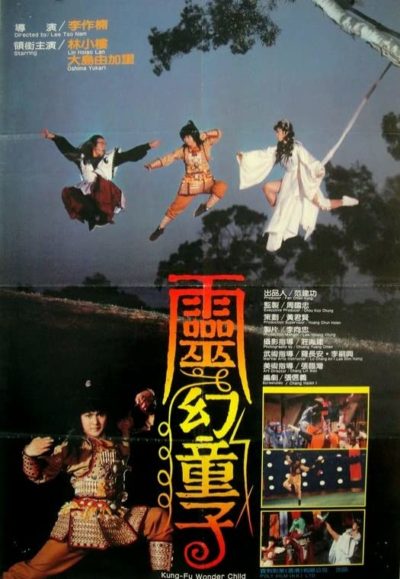 You may have noticed that I’ve been on a bit of a spree with these Taiwanese fantasy-fu flicks of late. However, I think I’m feeling a bit sated with them at this point, and the law of diminishing returns seems to be setting in. There are only so many unconvincing male impersonators, bad effects (both optical and practical) and almost illegible and/or illiterate subtitles a man can take, and I think I’ve reached my capacity in almost of these categories. Fortunately, my queue of such things seems to be nearing an end, with just a couple more to go. Still, after this delirious experience, I feel in need of a week or two’s break from the madness.
You may have noticed that I’ve been on a bit of a spree with these Taiwanese fantasy-fu flicks of late. However, I think I’m feeling a bit sated with them at this point, and the law of diminishing returns seems to be setting in. There are only so many unconvincing male impersonators, bad effects (both optical and practical) and almost illegible and/or illiterate subtitles a man can take, and I think I’ve reached my capacity in almost of these categories. Fortunately, my queue of such things seems to be nearing an end, with just a couple more to go. Still, after this delirious experience, I feel in need of a week or two’s break from the madness. Yeah, if the above line of subtitled dialogue makes sense, this film then ups the ante, with white subs on a frequently white background, and which frequently appear to be making a bid to escape from the bottom of the picture. It’s safe to say that a decent presentation of this, perhaps with a print which doesn’t look like it was left in someone’s pocket when their suit went to the cleaners, might merit a half-star more. A few more fight sequences would help too: the ones there are, don’t lack in quality. There’s just a bit too much farcical comedy for my taste.
Yeah, if the above line of subtitled dialogue makes sense, this film then ups the ante, with white subs on a frequently white background, and which frequently appear to be making a bid to escape from the bottom of the picture. It’s safe to say that a decent presentation of this, perhaps with a print which doesn’t look like it was left in someone’s pocket when their suit went to the cleaners, might merit a half-star more. A few more fight sequences would help too: the ones there are, don’t lack in quality. There’s just a bit too much farcical comedy for my taste.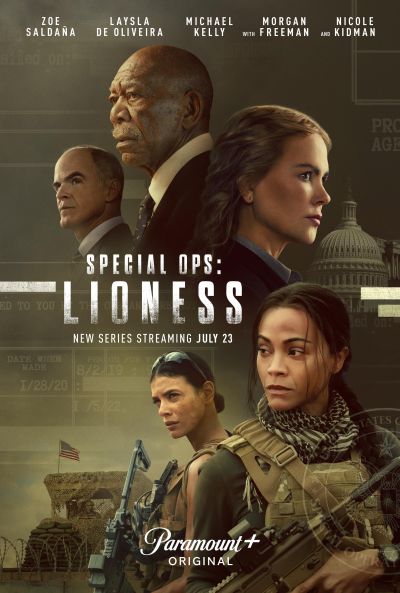 If 2023 has been underwhelming on the theatrical front (to put it mildly), the various streaming services have certainly had no shortage of entries to keep us occupied here. This one comes to us from Paramount+, and stars Saldaña – already known around these parts, most likely for
If 2023 has been underwhelming on the theatrical front (to put it mildly), the various streaming services have certainly had no shortage of entries to keep us occupied here. This one comes to us from Paramount+, and stars Saldaña – already known around these parts, most likely for